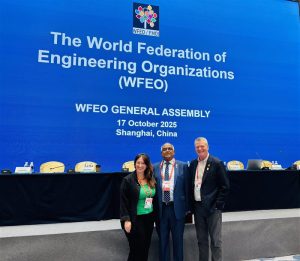 Earlier this month, ABET joined engineering leaders from around the world at the World Federation of Engineering Organizations (WFEO) 2025 Global Engineering Congress and General Assembly, held October 15–17 in Shanghai, China. The congress convened national and international representatives to advance engineering’s role in addressing global challenges — a mission that strongly aligns with ABET’s commitment to sustainability and quality in education. Representing ABET were CEO Dr. Michael K. J. Milligan and Senior Director of Global Communication and Marketing Dr. Amanda G. Taylor. Events like this play a vital role in fostering collaboration, sharing expertise, and driving progress toward a safer, more sustainable world.
Earlier this month, ABET joined engineering leaders from around the world at the World Federation of Engineering Organizations (WFEO) 2025 Global Engineering Congress and General Assembly, held October 15–17 in Shanghai, China. The congress convened national and international representatives to advance engineering’s role in addressing global challenges — a mission that strongly aligns with ABET’s commitment to sustainability and quality in education. Representing ABET were CEO Dr. Michael K. J. Milligan and Senior Director of Global Communication and Marketing Dr. Amanda G. Taylor. Events like this play a vital role in fostering collaboration, sharing expertise, and driving progress toward a safer, more sustainable world.
As a member of the Engineering Societies of America (ESA), ABET proudly participates in WFEO’s network of national engineering institutions and professional societies representing more than 30 million engineers across nearly 100 countries. “Sustainability is not just an engineering challenge — it’s a human one,” said Dr. Michael K. J. Milligan, ABET CEO. “We want students to see sustainability as a problem they must personally adopt, understand, and act on through innovation and collaboration. Preparing them to lead in this way is central to ABET’s mission and the future of our world.” Through ESA, ABET engages with WFEO to support the advancement of engineering in the public interest and help ensure that the values of quality, innovation and responsibility remain central to engineering education and practice worldwide.
The Federation is recognized by governments, intergovernmental organizations, international non-governmental organizations and the public as a respected and reliable source of advice and guidance on strategies and policies that use engineering and technology for the benefit of human development, wellbeing and sustainable development. ABET contributes to WFEO’s mission through its involvement in several of the Federation’s committees, including the Engineering Education Committee, which helps facilitate the evolution and improvement of engineering education globally. This work highlights higher education’s fundamental role in supporting sustainable development at a global scale. At ABET, we have an opportunity to support educators in helping students understand how engineering and the other STEM disciplines can solve the many problems facing our planet.
Our collaboration emphasizes the shared belief that engineers are essential to achieving the United Nations Sustainable Development Goals (SDGs) — from addressing climate sciences to ensuring access to clean water and sustainable energy. As an UNESCO-affiliated organization, WFEO played a key role in the development of the SDGs, which serve as exemplars of the most urgent sustainability challenges facing our world.
Sustainability has long been embedded in ABET’s approach to quality assurance. For more than a decade, the Engineering Accreditation Commission (EAC) criteria have incorporated essential elements of sustainable design. While accreditation through ABET is non-prescriptive, allowing programs to meet criteria in ways that best suit their missions, sustainability remains a guiding principle that ensures graduates are equipped to design solutions that balance social, environmental and economic needs.
In addition, ABET’s new Recognition of Credentials service reflects an ongoing commitment to global accountability, helping confirm that learners are achieving the outcomes promised by their institutions — a key aspect of sustainable educational systems.
“It was incredibly inspiring to connect with hundreds of participants from across the globe — all sharing their perspectives on how we can make meaningful progress toward solving the world’s most pressing problems,” said Dr. Amanda G. Taylor, ABET Senior Director of Global Communication and Marketing. “When we come together across borders and disciplines, we truly can move forward together.”
Through its partnership with WFEO, ABET continues to champion sustainability-driven engineering education and the broader goal of preparing students to lead in an increasingly interconnected and resource-conscious world. Together, both organizations are advancing the vision of a global engineering community united by shared values and a common purpose: using technology and innovation to build a more sustainable future for all.
Read more about WFEO here and ABET’s global engagement here.